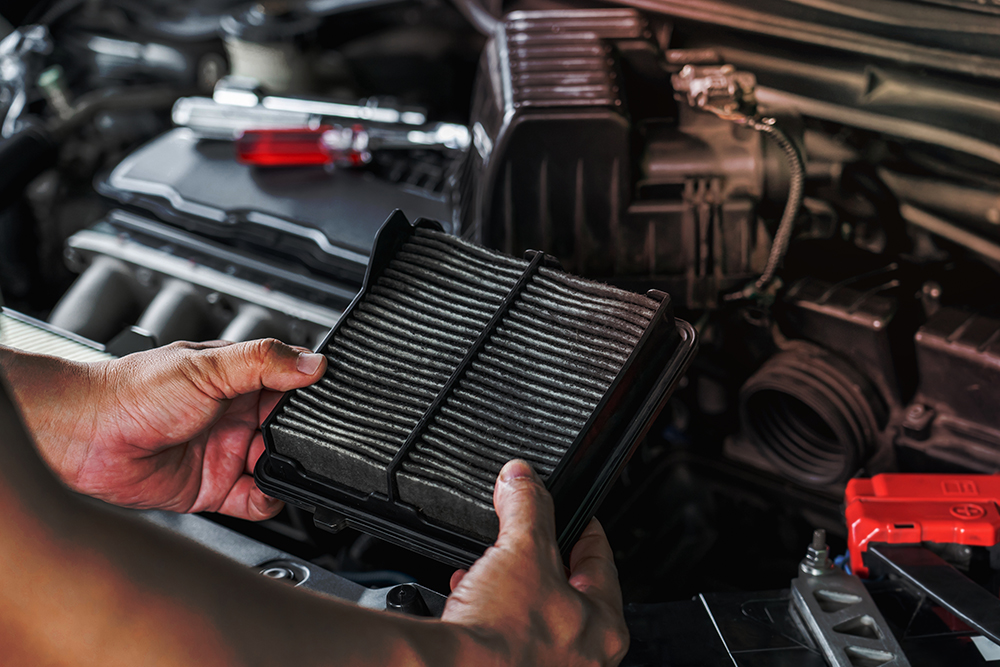
Your car is a complex machine with various components working together to ensure optimal and safe performance. Among these components, filters play a crucial role in maintaining the health of your vehicle. Filters are designed to trap and remove contaminants, preventing them from entering critical systems.
Did you know your car has a handful of different types of filters, each with a specific system to protect? To keep your car running smoothly, it's essential to understand the different filters in your vehicle and establish a regular maintenance schedule for their replacement. Those filters include:
Engine Air Filters
The engine air filter is responsible for preventing dirt, dust, and other debris from entering the engine. Over time, these particles can accumulate and restrict airflow, affecting combustion efficiency and overall engine performance. Experts recommend checking and, if necessary, replacing the engine air filter every 12,000 to 15,000 miles, though this can vary depending on driving conditions.
Cabin Air Filters
Cabin air filters ensure that the air circulating inside your car is free from pollutants, allergens, and odors. A clean cabin air filter is especially important for those with allergies or respiratory conditions. Typically, it's advisable to replace the cabin air filter every 15,000 to 25,000 miles, but again, this may vary based on your driving environment.
Oil Filters
Oil filters are integral to the lubrication system of your car, trapping contaminants and preventing them from circulating with the oil. As a general rule of thumb, it's recommended to replace the oil filter every time you change the engine oil. This typically occurs every 3,000 to 7,500 miles, depending on the type of oil used and your unique driving conditions.
Fuel Filters
Fuel filters are responsible for keeping impurities and debris from reaching the engine through the fuel system. The frequency of fuel filter replacement can vary widely, ranging from 20,000 to 40,000 miles or more, depending on the make and model of your vehicle. Consult your car's manual or ask a certified auto mechanic at Metro Motor for specific recommendations.
Transmission Filters
Automatic transmissions use fluid to operate, and the transmission filter helps keep this fluid free from contaminants. Transmission filters are generally replaced during regular transmission services, which may occur every 30,000 to 60,000 miles. However, it's essential to follow your vehicle's specific maintenance schedule.
Why Does It Matter? Benefits of Regular Filter Changes
Regular filter changes are a fundamental aspect of vehicle maintenance. Establishing a proactive schedule for replacing engine air filters, cabin air filters, oil filters, fuel filters, and transmission filters can significantly contribute to the longevity and performance of your car.
- Improved Performance: Regular filter changes contribute to optimal engine performance, ensuring efficient combustion, smoother airflow, and proper lubrication.
- Extended Engine Life: By preventing contaminants from entering critical systems, filters play a vital role in prolonging the life of your engine and other components.
- Better Fuel Efficiency: Clean filters help maintain the right air-to-fuel ratio, promoting better fuel combustion and, consequently, improved fuel efficiency.
- Enhanced Air Quality: Cabin air filters contribute to a healthier driving environment by trapping allergens and pollutants, benefiting both the driver and passengers.
Consult your car's manual and seek professional advice to determine the specific replacement intervals for your vehicle. Remember, a small investment in filter maintenance can lead to substantial long-term savings and a smoother, more reliable driving experience. If you’re unsure when your vehicle’s filters were last changed, stop by one of Metro Motor’s auto shops near you for a bumper-to-bumper diagnostic inspection.
Vehicle care information made available by Metro Motor is presented as helpful advice for general maintenance and should not be construed as instructions for at-home vehicle service. Be sure to consult your owner’s manual and a licensed, professional mechanic for diagnostics and repair.
